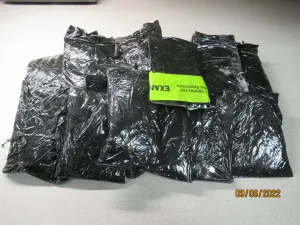CHICAGO–U.S. Customs and Border Protection (CBP) officers at the Area Port of Chicago have been busy this fiscal year seizing shipments of dangerous products and counterfeit items to ensure arriving packages are safe for our communities.
During Fiscal Year 2022, which ran from October 1, 2021 to September 30, 2022, CBP officers in Chicago seized 8,174 pounds of narcotics and $23 million in counterfeit merchandise.
Chicago CBP seized 3,785 shipments containing narcotics this year. This year the number one seized drug in Chicago were prescription drugs such as Tylenol with codeine, testosterone, or Xanax. CBP officers seized a total of 1,330 pounds of these drugs. Coming in second was Marijuana, totaling 970 pounds. Although medical and recreational marijuana may be legal in some U.S. States and Canada, the sale, possession, production, and distribution of marijuana all remain illegal under U.S. federal law. Dimethyltryptamine, or DMT, finished in third, with CBP seized 103 pounds of this dangerous schedule I controlled substance that is used for its psychoactive effects.
Additionally, Chicago CBP intercepted 281 shipments of counterfeit cargo with handbags, watches and jewelry being the top seized items. Had these items been real the Manufacturer’s Retails Sales Price would have been $23 million. CBP plays an essential role in protecting the economy and consumers’ safety and health, legitimate businesses, and the global supply chain. Nationally, CBP seized over 24.5 million shipments of IPR violations that would have been worth just shy of $3 billion, had the goods been genuine.
There are several steps that consumers can take to protect themselves when shopping online. Purchase goods only from reputable retailers and be wary of third-party vendors. Check seller reviews and verify there is a working phone number and address for the seller, in case you have questions about the legitimacy of a product.
“The knowledge and unwavering dedication displayed by our uniformed officers, agriculture specialist, import and entry specialist, and those employees that support frontline operations is key to our success,” said LaFonda Sutton-Burke, Director Field Operations-Chicago. “Regardless of the environments our men and women are assigned – airports, international mail facilities, express consignment cargo hubs, and along the Great Lakes. We are all linked through our commitment to serve our country.”
Additionally, CBP Agriculture Specialists in Chicago conducted 45,033 agriculture inspections. These inspections largely consisted of food products including prohibited meat products, fresh fruits, and vegetables. Fresh fruits and vegetables have the obvious risk of transporting pests or diseases that could cause serious outbreaks to the United States agriculture crops. These pests and diseases would otherwise be separated from this continent by oceans. Animal products such as cured meats may also be dangerous to our agriculture. Though these products may have undergone a process to preserve them for human consumption (e.g. curing to prevent the growth of bacteria), economically important livestock viruses may actually be preserved within that animal tissue staying viable longer than in raw meat. Discarded products may then provide a path for the introduction of that disease into the United States.
CBP also seized more than $1.45 million in United States currency and arrested 189 criminals that were departing or arriving at O’Hare with outstanding warrants.
“The men and women at the Port of Chicago are committed to protecting America’s border while enabling legitimate trade and travel,” said Chicago’s Acting Port Director Ralph Piccirilli. “We will continue to anticipate, identify, and address all risks and benefits that come with the accelerated pace international trade has experienced over the past few years. I am very proud of my team. Their dedication to the CBP mission is second to none.”
CBP conducts operations at ports of entry throughout the United States, and regularly screens arriving international passengers and cargo for narcotics, weapons, and other restricted or prohibited products. CBP strives to serve as the premier law enforcement agency enhancing the Nation’s safety, security, and prosperity through collaboration, innovation, and integration.



